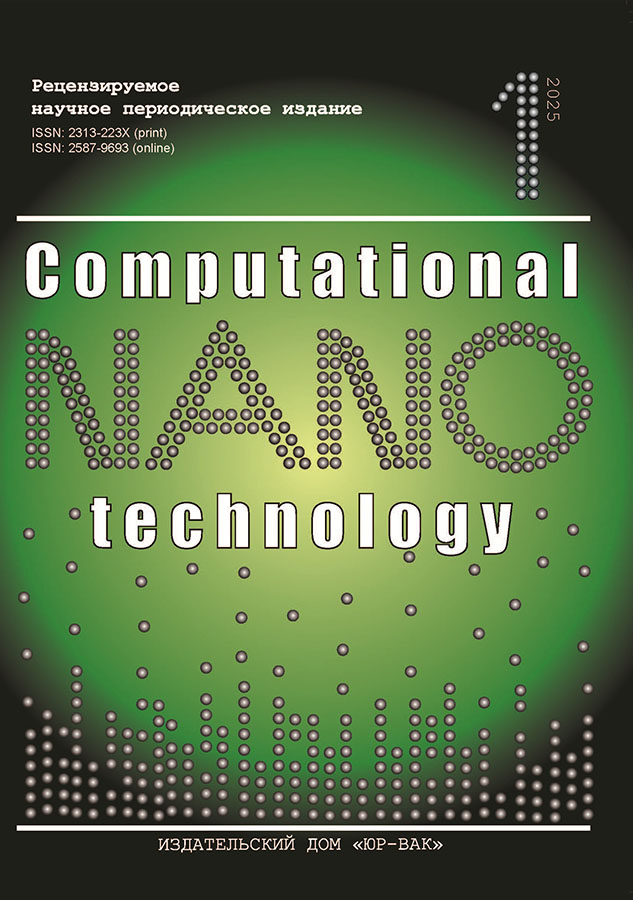Algorithm of a Culturally Sensitive Recommender System to Solve Cold Start Problems
- 作者: Sukhorukov A.I.1, Starostin A.S.2, Medvedev A.V.3, Belova N.N.3, Lemdyasova E.A.3
-
隶属关系:
- Plekhanov Russian University of Economics
- Russian Customs Academy
- Russian Biotechnological University
- 期: 卷 12, 编号 1 (2025)
- 页面: 48-58
- 栏目: INFORMATION TECHNOLOGY AND TELECOMMUNICATION
- URL: https://journals.eco-vector.com/2313-223X/article/view/679128
- DOI: https://doi.org/10.33693/2313-223X-2025-12-1-48-58
- EDN: https://elibrary.ru/MHMMOE
- ID: 679128
如何引用文章
详细
A fundamental problem faced by modern recommendation systems is the cold-start phenomenon, which is the inability to generate personalized recommendations when historical data on user preferences is scarce. Traditional methods of solving this problem involve collecting information through questionnaires or involving data from third-party sources, which may lead to compromising user privacy. In this paper, we propose an algorithm based on Hofstede’s cultural measurement theory to generate recommendations without the need to obtain personal data directly. The algorithm establishes links between users by analyzing their cultural characteristics, which helps to improve the accuracy of preference prediction. To further improve the results, a matrix factorization method is applied to identify hidden patterns in user preferences even in the absence of explicit system interaction data. The effectiveness of the approach proposed by the authors has been confirmed during experiments on the WS-Dream dataset. The results demonstrate that taking cultural factors into account can significantly improve the quality of recommendations, especially in cold-start environments. The integration of the matrix factorization method facilitates more accurate modeling of latent factors affecting user choice and allows recommendations to be adjusted according to the identified patterns. Incorporating cultural characteristics into the recommendation process outperforms conservative methods based solely on behavioral data and provides a more personalized approach to new users.
全文:
作者简介
Alexander Sukhorukov
Plekhanov Russian University of Economics
编辑信件的主要联系方式.
Email: Sukhorukov.AI@rea.ru
ORCID iD: 0000-0001-5164-3135
SPIN 代码: 6563-5403
Scopus 作者 ID: 57193715398
Dr. Sci. (Eng.); Professor of the Basic Department of Project and Program Management of Capital Group
俄罗斯联邦, MoscowAnatoly Starostin
Russian Customs Academy
Email: as.starostin@customs-academy.ru
SPIN 代码: 3159-2912
Cand. Sci. (Eng.), Associate Professor, Acting Head of the Department of Applied Informatics
俄罗斯联邦, LyubertsyAlexander Medvedev
Russian Biotechnological University
Email: medvedevav@mgupp.ru
ORCID iD: 0000-0003-1918-1967
SPIN 代码: 6369-3593
Scopus 作者 ID: 58565470100
Cand. Sci. (Econ.), Associate Professor of the Department of Informatics and Computer Science of Food Production
俄罗斯联邦, MoscowNadezhda Belova
Russian Biotechnological University
Email: bnn.belova@yandex.ru
ORCID iD: 0000-0001-7577-1721
SPIN 代码: 1324-8476
Scopus 作者 ID: 57220545069
Cand. Sci. (Eng.), Associate Professor of the Department of Informatics and Computer Science of Food Production
俄罗斯联邦, MoscowEkaterina Lemdyasova
Russian Biotechnological University
Email: lemdyasova@yandex.ru
俄罗斯联邦, Moscow
参考
- Brusilovsky P. Access to social information: the other side of the social web. In: International Conference on Current Trends in Theory and Practice of Computer Science. Springer, 2008. Pp. 5–22.
- Bezuglova N.P. Girt Hofstede’s model of four parameters of culture. Bulletin of Moscow State University of Culture and Arts. 2008. No. 5. Pp. 29–32. (In Rus.)
- Adomavicius G., Tuzhilin A. Toward the next generation of recommender systems: An overview of the state of the art and possible extensions. In: IEEE Transactions on Knowledge and Data Engineering 17.6. 2005. Pp. 734–749.
- Vorontsov K., Potapenko A. Tutorial on probabilistic topic modeling: Additive regularization for stochastic matrix factorization. In: International Conference on Image, Social Network and Text Analysis x000D. Springer, 2014. Pp. 29–46.
- Obolensky D.M., Shevchenko V.I. Review of modern methods of building recommendation systems – content-based and hybrid systems. In: Collection of articles of the All-Russian scientific and technical conference of students, graduate students and young scientists “The World of Computer Technologies” (Sevastopol, April 5–9, 2021). Sevastopol: Sevastopol State University, 2021. Pp. 151–156.
- Medvedev A.V., Medvedev A.A. Forecasting financial markets using advanced machine learning algorithms. In: E3S Web of Conferences. 2023. No. 403. Art. 08007.
- Medvedev A.V., Medvedev A.A. Development of a mathematical model for planning team readiness for IT solution implementation projects. In: E3S Web of Conferences. 2023. No. 403. Art. 01030.
- Medvedev A.V., Medvedev A.A., Shuchkov M.D. Concept of food management using RFID technology: Minimizing losses and increasing consumer awareness. Computational Nanotechnology. 2024. Vol. 11. No. 1. Pp. 85–93. (In Rus.). doi: 10.33693/2313-223X-2024-11-1-85-93. EDN: DXHSQM.
- Dimitrieva A.I., Popov A.P., Kovalenko A.V. et al. Toward the selection of machine learning model for detection of blood forming elements of farm animals. Bulletin of Chuvash State Agrarian University. 2023. No. 1 (24). Pp. 55–62. (In Rus.). doi: 10.48612/vch/mma8-t4ta-89nt. EDN: NGHQGA.
- Pyankova S.G., Ergunova O.T., Belova M.V. Neural networks as a qualitative shift in the development of technologies in the trends of the theory of noonomics. Ufa Humanitarian Scientific Forum. 2024. No. 2 (18). Pp. 126–143. (In Rus.). doi: 10.47309/2713-2358-2024-2-126-143. EDN: WYCBDX.
- Medvedev A.V., Medvedev A.A., Kireychenkov N.S. Implementation of RPA bots in cold supply chain logistics. Computational Nanotechnology. 2024. Vol. 11. No. 2. Pp. 35–42. (In Rus.). doi: 10.33693/2313-223X-2024-11-2-35-42. EDN: MMOQKQ.
- Artemyev V.S., Mokrova N.V. Method of the first approximation of the stability analysis of the electrical equipment control systems. Computational Nanotechnology. 2024. Vol. 11. No. 3. Pp. 52–56. (In Rus.). doi: 10.33693/2313-223X-2024-11-3-52-56. EDN: QGSYPS.
- Artemyev V.С., Maksimov A.S. Implementation of the Simoyu method for modeling transient processes of a control object. Computational Nanotechnology. 2024. Vol. 11. No. 3. Pp. 43–51. (In Rus.). doi: 10.33693/2313-223X-2024-11-3-43-51. EDN: QGRTWW.
- Mokrova N., Artemyev V., Hajiyev A. Design of reversible thyristor feed drive with proportional-integral controllers. Machine Science. 2024. Vol. 13. No. 2. Pp. 13–28. doi: 10.61413/IYNU7656.
- Tikhonov V.A., Belov V.V., Artemyev V.S. Analysis of basic models of transport flow. International Journal of Applied and Fundamental Research. 2017. No. 3-2. Pp. 175–177. (In Rus.)
- Ahmedov B., Artemyev V., Kaya H. Modelling of automatic control system on an electronic model. Machine Science. 2024. Vol. 13. No. 2. Pp. 65–76. doi: 10.61413/RSGZ7710.














